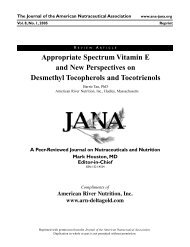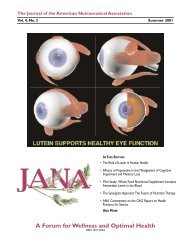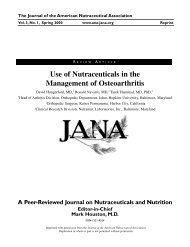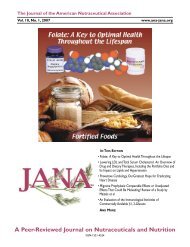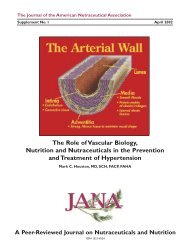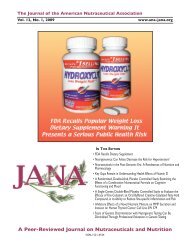JANA Vol 9 #1 - American Nutraceutical Association
JANA Vol 9 #1 - American Nutraceutical Association
JANA Vol 9 #1 - American Nutraceutical Association
Create successful ePaper yourself
Turn your PDF publications into a flip-book with our unique Google optimized e-Paper software.
C L I N I C A L R E S E A R C H<br />
Pilot Study: Flaxseed Supplementation Was<br />
Effective in Lowering Serum Glucose and<br />
Triacylglycerol in Glucose Intolerant People<br />
* Correspondence:<br />
Y Rhee, PhD<br />
Department of Health, Nutrition and Exercise Sciences<br />
North Dakota State University, 351 EML<br />
Fargo, ND, 58105.<br />
Phone: 701-231-7476 Fax: 701-231-7174<br />
E-mail: yeong.rhee@ndsu.edu.<br />
Yeong Rhee, PhD,* Ardith Brunt, PhD<br />
Department of Health, Nutrition and Exercise Sciences<br />
North Dakota State University, Fargo, North Dakota<br />
ABSTRACT<br />
Background: Glucose intolerance increases the risks<br />
of diabetes and cardiovascular disease development.<br />
Objective: The effects of full-fat yellow omega flaxseed<br />
(flaxseed) or durum wheat bran (wheat bran) supplementation<br />
on fasting serum glucose (FSG), total cholesterol (TC),<br />
triacylglycerol (TG), high-density lipoprotein (HDL) cholesterol<br />
and low-density lipoprotein (LDL) cholesterol concentrations<br />
in glucose intolerant people were investigated.<br />
Design: To screen subjects for glucose intolerance, an<br />
oral glucose tolerance test was performed. Nine glucose intolerant<br />
people received either 40 g of flaxseed or wheat bran for<br />
12 weeks, followed by a 4-week washout period. Then they<br />
received the other supplement for the next 12 weeks.<br />
Results: Baseline dietary intake, FSG, TC, TG, HDL,<br />
and LDL among subjects was not different. No differences<br />
in weight, TC, HDL, and LDL between treatment groups or<br />
in individuals were observed 12 weeks later. However, 12<br />
weeks of flaxseed supplementation significantly lowered<br />
FSG compared to baseline (p=0.02) and wheat bran supple-<br />
mentation (p=0.04). Twelve weeks of flaxseed supplementation<br />
significantly lowered TG compared to wheat bran<br />
supplementation (p=0.02). Flaxseed supplementation<br />
showed a superior effect on lowering FSG and TG when<br />
compared to wheat bran supplementation.<br />
Conclusion: These results suggested that flaxseed may<br />
lower FSG and TG in glucose intolerant individuals.<br />
Key Words: glucose intolerance, flaxseed, wheat bran,<br />
antioxidant, fasting serum glucose, triacylglycerol.<br />
INTRODUCTION<br />
The number of people with diabetes in the US has been<br />
increasing steadily in all age groups over the past ten years,<br />
with larger increases in younger populations. For example,<br />
the incidence of type 2 diabetes increased 70% among people<br />
aged 30 to 39 years in the past ten years. 1,2 In 2002,<br />
18.2 million people were diagnosed with diabetes, about<br />
90-95% of them with type 2 diabetes. 3 About 15.6% of the<br />
population aged 40-74 years have impaired glucose tolerance.<br />
4 Individuals with impaired glucose tolerance have an<br />
increased risk of developing type 2 diabetes and cardiovascular<br />
disease. 4 About 2.3-11% (5-8% average) of people<br />
with impaired glucose tolerance develop type 2 diabetes<br />
annually. 5<br />
Increasing evidence now indicates that antioxidants<br />
play roles in the prevention and/or delay of diabetes and the<br />
development of diabetic complications. 6-8 Reactive oxygen<br />
species (ROS) and increased oxidative stress have been<br />
implicated in the development of diabetes and diabetic<br />
28 <strong>JANA</strong> <strong>Vol</strong>. 9, No. 1, 2006




